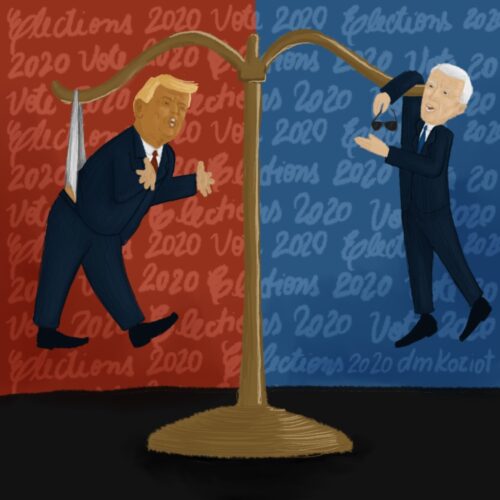All Talk, No Solution. Will the Next Presidential Nominee Finally Give Us An Answer?

By Erin Duncan
Collaborator to The Guardsman
As humanity is plagued by a global pandemic, the United States is facing a critical event: the presidential election.
We’re in a new era of divisiveness and turmoil, with ongoing debates about health care, as well as social, economic, and environmental issues. Both candidates, President Donald J. Trump and former Vice President Joe Biden, are attempting to win over the American people, but with elusive answers to critical issues, taking advantage of our limited options within a two-party system.
The first debate was a botched attempt by both parties at conveying clear messages and decisive viewpoints. With Trump arguing red-cheeked to the bitter end and Biden circumventing solid answers, the future of politics appears bleak.
A significant issue, possibly the most discussed, is the approach in tackling the COVID-19 pandemic. Both have differing ideals regarding mask-wearing, with Trump taking the stance that masks are inconsequential to the spread of COVID-19. In addition, both candidates want to reopen schools, which could put teachers and their students at risk.
In June, the Trump administration notified the United Nations that he would withdraw the U.S. from the World Health Organization (WHO). Biden, on the other hand, pledged to reinstate the U.S. government’s membership in the WHO.
Neither candidate appears capable of accepting responsibility for their actions or words. Trump insists that the quick spread and devastation of COVID-19 had nothing to do with his inactions, and everything to do with China.
Meanwhile, Biden deflects questions about his statement, “If you have a problem figuring out if you’re for me or Trump, then you ain’t Black.” He instead prefers to discuss decriminalizing marijuana in order to aid Black communities, but this response is prejudicial because it implies that drug use is a Black issue.
On the other hand, Trump spreads racism when he hesitated to condemn white supremacists, as he deflected scrutiny by bringing up the dangers of Antifa.
Biden proposed reforming the institution of policing by incorporating social workers and psychologists into the police force. Trump was asked about police reform and evaded the question by claiming that he has, “done more for the African American community than any president with the exception of Abraham Lincoln.” This is not truly an answer to the question at hand, and it appears that Trump would not partake in police reform if re-elected.
Ironically, Trump has withdrawn troops from the Middle East, which has created a movement towards peace in other parts of the world. However, he simultaneously promotes civil unrest in the country that he is sworn to protect.
Moving down the list of critical issues, whether environmental or economic, each candidate has taken a standpoint with little evidence to back up his points of view. This situation brings up a larger question: why are there only two valid candidates up for election?
If most of the United States’ population is made up of independent voters, then why is there a two-party system to uphold? Neither candidate has discussed voting reform to address the under-representation of the majority of Americans. This may be the most critical issue, as it could fundamentally change our political system.
